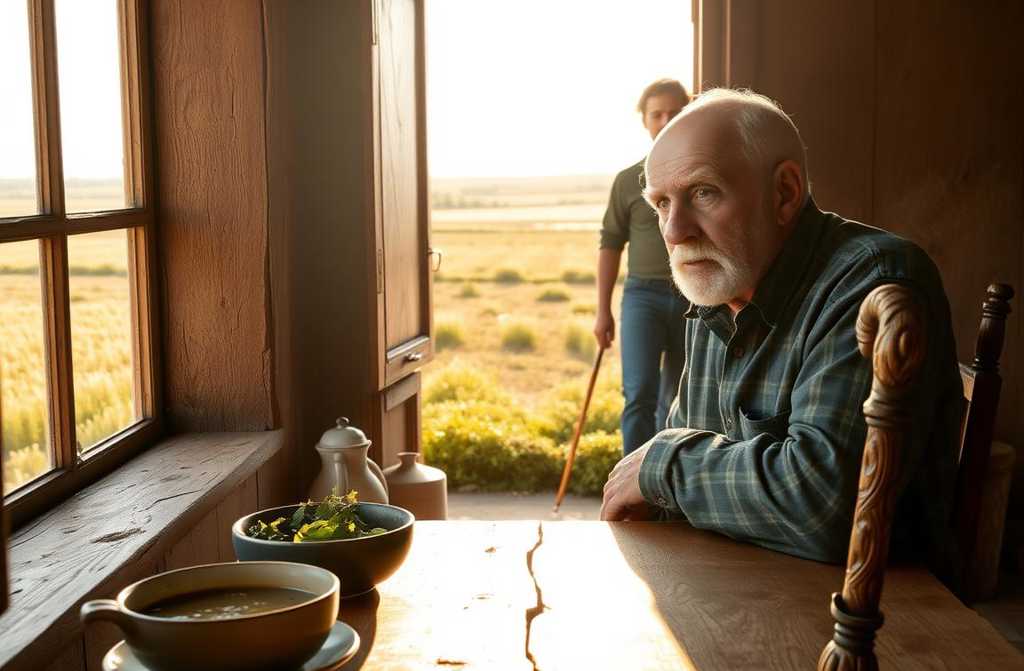Seven long years had passed since the earth took Lydia. Seven years of silence that rang louder than any music in my ears, and a loneliness that clung to the walls of the house like the smell of woodsmoke. Stepheneveryone called him Steviewas left alone at sixty-three. Not old, not young, just stuck between two shores: behind him, a life full of love and storms; ahead, only the quiet, joyless drift toward the inevitable end.
God hadnt cursed him with ill health. His body, hardened by years of labour, still had strength, but his soul was broken and hollow. Lydia had faded slowly, painfully. Hed cared for her till her last breath, till the final tear on her worn cheek. And then she was gone, leaving him alone in this wide world. The Lord hadnt given them children, so theyd lived soul to soul in their little universe, bound by the edges of their village.
Lydia had been the sun of his small world. She was the warmth that filled the house, the light that made it a home. Her hands cooked the best stews, baked pies with pastry so light it melted on the tongue. She ran the household: the dairy cow, the chickens, a calf fattened each year so theyd have their own meat in winter. The garden was her kingdom, ruled by neat rows of carrots, onions, and potatoes. His work was the heavy labourploughing, digging, mending what broke. He was the outer wall of their fortress; she was its heart.
A man gets used to anything. Stevie got used to silence. At first, it pressed on him, rang in his ears, made him flinch at every floorboard creak. Then it became background noise. Boring? Yes. Unbearably empty? Absolutely. But what could he do? That was fates will, and you dont argue with fate.
The village women eyed him, of course. Stevie was a fine figure, a good provider, his house fulland childless, which in the village was like winning the lottery. They sent matchmakers, hinted themselves, some even offered outright to “start a family.” But he brushed them off like bothersome flies.
“I miss my Lydia,” hed tell them, staring past their heads into nothing. “She sees everything from up there. She wouldnt approve of another woman in her house, dimming her memory.”
But the truth in his quiet thoughts was different: “To live together, thered need to be a spark. A drop of affection. And there isnt. Maybe Im not ready yet. My soul hasnt moved on.”
After Lydias death, he sold the cowwhat use was so much milk to one man? A good Friesian, it gave a pail morning and evening. Sold it to the next village, his chest tight with guilt, as if hed betrayed another living thing tied to her. But he kept the calffor meat. So he lived: his own meat, his eggs, milk bought or given in pity by the neighbour Annie, who looked at him with silent sympathy.
Stevie limped. Long ago, a stubborn mare had broken his leg. The bone set crooked, but hed shrugged it offno time for fussing. The limp became part of him, and in recent years, a cane appearedcarved oak, a gift from Lydia. No one noticed his unsteady walk anymore, as if it had always been that way.
One day, he sat at the table, alone, ladling fresh stew into a bowl. The summer heat hung thick, the air shimmering over the fields. The door to the porch stood wide open, letting in lazy waves of scorching air. Suddenly, a shadow crossed the sunlit patch on the floor.
“Ahoy, Stevie! Didnt wait for an invitedoor was open!” The booming voice of Tom, his neighbour two doors down, filled the room. Tom was younger, full of restless energy and plans Stevie couldnt fathom.
“Hello,” Stevie grunted. “Fancy some stew? Just off the stove. Toss in some spring onionswont regret it. Join me.”
“Dont mind if I do! Love your stew. Hot as it is, its still a treat. Well cool off later!”
Tom wolfed it down, eyeing Stevie slyly.
“Been thinking, Stevietime you remarried. No life for a man, stuck by the stove. A wifed cook your stew, make your bed, andwell, you know.”
“Playing matchmaker?” Stevie smirked. “Found me a bride, then?”
“Whats wrong with that?” Tom grinned. “How long you gonna mope? Youre a catchcould have your pick!”
“A womans not just a body,” Stevie said softly but firmly. “Got to fit soul to soul. Understand each other without words.”
Tom waved a hand. “Soul? Youre past seventy! Who cares about souls now? Just need someone to tend you, bring tea if youre poorly. Think ahead!”
“Ahead?” Stevie put down his spoon, looking straight at him. “You think Im some doddering fool, ready to shack up with the first willing woman? No, Tom. Ive still got choices. And Ill live as I please.”
Tom flushed. “Didnt mean it like that! Just looking out for you! Got an auntAgatha. Next county over, village by the lake. Firecracker of a woman. Keeps pigs, geese, a calf. Sturdy, too. Name like Agathaproper, eh? Visited her lately. Brisk as they come, but alone. Fancy a trip? Meet her. Like hersorted.”
“Whats in a name?” Stevie sighed. “Sharing a roof means work. Modern women love themselves more than labour. Shed want pampering, not digging potatoes. Im no charmer now. And at my age, chasing brides feels wrong.”
Tom rubbed his chin. “Ah, come on! Ill go with you. Shes familywed be practically kin! You know me, I know you. All cosy!”
The talk dragged on till evening. Wearied by Toms pushiness and his own flicker of curiosity, Stevie gave in. Theyd go in two days, Saturday, in Toms battered old Rover.
When Tom left, Stevie sat in the silence. The idea of remarriage, once abstract, now had weight. He looked around his house and saw it afresh: dust on the sills, cluttered with junkjars, nails, dried leaves Lydia once collected. The floor, long unscrubbed. A mountain of dishes in the sink.
Next morning, dawn barely broken, he rose as if whipped by some inner urge. He wiped the sills, ruthlessly tossed the clutter. Scrubbed the floor, the fresh smell oddly lifting his spirits. Then the dishes. Found an old bottle of washing-up liquid, squeezed out froth thick with lavender scent.
“Well,” he thought, watching plates gleam under the tap, “thats a mood. Might as well do the mugs. Been a while since I spruced up.”
Saturday morning, Tom honked outside. Stevie wore his only good suit, still decent though it smelled of mothballs and the past. The road was long and potholed. They arrived by noon.
Toms car halted by a leaning but sturdy fence. From the gate stepped a woman. Pleasant-faced, mid-fiftiesa good decade younger than Stevie. Her smile was bright, too rehearsed.
“Finally! Dinners gone cold! What kept you?” she called before theyd even stepped out.
Her tone, her familiarity, sent a chill through him. He knew thenhed been bartered off without his say. His hand twitched toward the door handle, ready to tell Tom to turn back. But then he caught her whisper to her nephew:
“He a cripple?” Her eyes flicked to his cane.
Tom stammered, “No, Aunt Agathajust an old limp. Nothing to fret over.”
She stepped closer, offering a hand. Her palm was soft, oddly smooth for a labourers.
“Welcome, dear. Im Agatha,” she simpered.
He shook awkwardly. “Afternoon. Stephen. Or Stevie.”
A glance at her yard showed order: neat beds, a freshly whitewashed shed, not a weed in sight. “Hard worker,” he noted. “A real homemaker.”
Inside, the same precision. But the table stole his gazegroaning under roast potatoes with pork, pickles, golden pancakes by a crock of cream, salted bacon, spring onions, and, crowning it all, meat pies wafting temptation. “Generous,” he thought. “Pulled out all stops.” Tom winked: “Told you! Proper hostess!”
Agatha proved it, piling his plate, showering compliments.
“Oh, Stephen, what a fine man! So well kept! Cant believe you live alone! And your limpbarely notice!” She leaned in. “Tom said youve no wife?”
“None,” he said.
“Any children?”
“God didnt bless us







